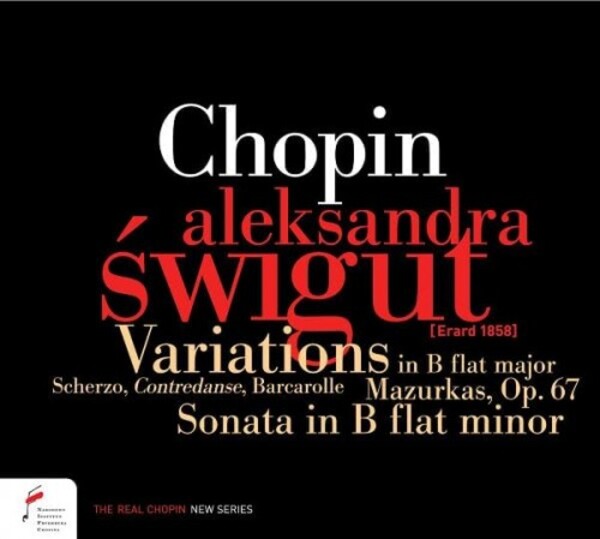CHOPIN Variations in B-Flat Major. Sonata in B-Flat Minor (Aleksandra Swigut)
View record and artist detailsRecord and Artist Details
Genre:
Instrumental
Label: NIFC
Magazine Review Date: 05/2024
Media Format: CD or Download
Media Runtime: 80
Mastering:
DDD
Catalogue Number: NIFCCD095

Tracks:
| Composition | Artist Credit |
|---|---|
| Barcarolle |
Fryderyk Chopin, Composer
Aleksandra Swigut, Piano |
| Contredanse |
Fryderyk Chopin, Composer
Aleksandra Swigut, Piano |
| (24) Preludes, Movement: No 4 |
Fryderyk Chopin, Composer
Aleksandra Swigut, Piano |
| Mazurkas (Complete), Movement: No. 42 in G, Op. 67/1 (1835) |
Fryderyk Chopin, Composer
Aleksandra Swigut, Piano |
| Mazurkas (Complete), Movement: No. 43 in G minor, Op. 67/2 (1849) |
Fryderyk Chopin, Composer
Aleksandra Swigut, Piano |
| Mazurkas (Complete), Movement: No. 44 in C, Op. 67/3 (1835) |
Fryderyk Chopin, Composer
Aleksandra Swigut, Piano |
| Sonata for Piano No. 2, 'Funeral March' |
Fryderyk Chopin, Composer
Aleksandra Swigut, Piano |
| (4) Scherzos, Movement: No. 3 in C sharp minor, Op. 39 (1839) |
Fryderyk Chopin, Composer
Aleksandra Swigut, Piano |
| Variations on 'Là ci darem la mano' (Mozart's Do |
Fryderyk Chopin, Composer
Aleksandra Swigut, Piano |
Author: Jed Distler
Keeping track of the Narodowy Instytut Fryderyka Chopina’s ‘The Real Chopin’ period-instrument releases can be daunting, given the sheer volume of product that’s flooded the market for almost two decades. Yet it can also be delightful, especially when confronted by such an engaging and creative piano personality as Aleksandra Świgut. I first encountered her during the 2021 Warsaw Chopin Competition’s preliminary round. The following year I heard her give marvellous performances of Chopin’s B flat minor Sonata, Op 35, and ‘Là ci darem la mano’ Variations, Op 2, at Cremona Mondomusica. Clearly she’s just as at home on this recording’s vintage 1858 Érard as she is on a state-of-the-art Fazioli concert grand.
In Op 2 she insouciantly toys with Var 1’s scattershot runs and tosses off Var 3’s tricky repeated notes effortlessly. I especially love her wittily timed hesitations and caesuras in the Alla polacca finale. Likewise, her dramatic pause right before the first repeated forte chords in the C sharp minor Scherzo’s introduction intensifies their shock value. She negotiates the main octave theme more deftly than most pianists can play single notes, while the instrument’s light action and slightly muffled patina enhances Świgut's well-differentiated legato and détaché articulation. By contrast, the pianist leisurely sings out the G flat Contredanse, and makes it sound like important music.
Those who were weaned on and possibly spoiled by Arthur Rubinstein’s eloquently sculpted and magically proportioned Barcarolle (his long, unwritten yet utterly convincing ritardando in the coda still makes me cry, especially in his live Moscow performance of October 1, 1964) will find Świgut too rhapsodic as she dawdles on small details at the expense of the bigger picture. Here I find her habit of arpeggiating chords a bit wearing and predictable over time. However, Chopin’s Mazurkas always lend themselves to multiple interpretative gambits. The three Op 67 selections withstand Świgut's subjective touches, from the dry angularity of No 1’s chords and No 2’s brooding introspection to No 3’s melodic lingering.
Świgut brings crisply delineated fingerwork and bracing dynamic contrasts to the Second Sonata’s Doppio movimento. Her pearly cantabiles and flexible phrasing hold interest in the Scherzo’s Trio, although the outer sections’ rhythmic momentum slightly sags when Świgut slows down right before the notorious chord-octave leaps. Although the pianist commences the Funeral March at a hypnotically sustained snail’s pace, she somewhat loosens her grip in the Trio. As in Beatrice Rana’s recent modern-piano recording (Warner, 3/24), Świgut subjects the finale’s unison lines to liberal metric leeway and intriguing accentuations. The final selection is an improvisation on Chopin’s E minor Prelude, Op 28 No 4, where the basic steady left-hand rhythm persists even as the harmonies grow further afield of Chopin’s originals, and not all that further afield, I might add. The same goes with Świgut's sincere yet rather bland melodic invention. Still, she has a good instinct for improvising, and I hope she’ll become more daring. In all, a distinctive release.
Explore the world’s largest classical music catalogue on Apple Music Classical.
Included with an Apple Music subscription. Download now.

Gramophone Digital Club
- Digital Edition
- Digital Archive
- Reviews Database
- Full website access
From £8.75 / month
Subscribe
Gramophone Full Club
- Print Edition
- Digital Edition
- Digital Archive
- Reviews Database
- Full website access
From £11.00 / month
Subscribe
If you are a library, university or other organisation that would be interested in an institutional subscription to Gramophone please click here for further information.




